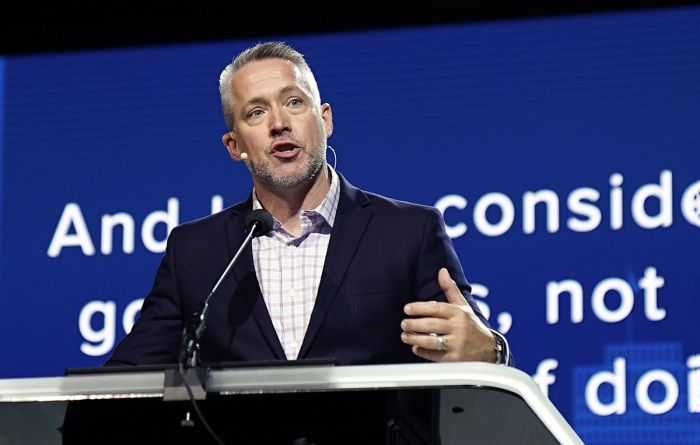JD Greear backs black churches’ challenge to SBC’s vote to ban women pastors

Former president of the Southern Baptist Convention, J.D. Greear, has backed the National African American Fellowship’s challenge to a recent vote by SBC messengers to ban women from serving as a "pastor of any kind" as an "unnecessary infringement upon the autonomy of the local church."
“This amendment forces conformity down to tertiary levels in ways that will both violate local church autonomy and are inconsistent with our past practice,” wrote Greear, who leads The Summit Church in Durham, North Carolina, in a piece published on his website Wednesday.
“If we continue down this road, we might become a Convention that spends its time focused on who is in and who is out, instead of on the best ways to reach our communities and glorify Jesus. If you want a harbinger of that, just take a look at Southern Baptist social media feeds right now. Is this what we want our Convention to be about?” he asked. “I’m tired of micromanaging churches; I want to be about the Great Commission. There are too many people on their way to Hell for us to get quagmired in policing each other.”
The NAAF is a network of more than 4,000 predominantly African American churches affiliated with the Southern Baptist Convention. Gregory Perkins, the network’s president and lead pastor of The View Church in Menifee, California, argued in a July 3 letter to SBC President Bart Barber that despite being in theological alignment with the denomination, many black Southern Baptist churches allow women to use the title “pastor” under the leadership of a male senior pastor.
"Many of our churches assign the title 'pastor' to women who oversee ministries of the church under the authority of a male Senior Pastor, i.e., Children's Pastor, Worship Pastor, Discipleship Pastor, etc.," Perkins wrote. "To disfellowship like-minded churches who share our faith in Jesus Christ, our belief in the authority of Scripture, our mandate to carry out the Great Commission, and our agreement to give cooperatively based upon a local-church governance decision, dishonors the spirit of cooperation and the guiding tenets of our denomination."
Perkins said prohibiting churches from allowing women to hold the title "pastor" would be challenging for many black Southern Baptist congregations even though the SBC’s Baptist Faith & Message 2000 states that "the office of pastor is limited to men as qualified by Scripture."
He further suggested that the ramifications of banning women from serving as a "pastor of any kind" were not properly considered, and the denomination needs to hear from a diversity of voices on the issue.
A proposed amendment to the SBC constitution clarifying that women cannot serve as pastors passed with approximately 80% of the vote from more than 12,000 messengers on June 14 at the SBC's Annual Meeting. Proposed by Pastor Mike Law of Arlington Baptist Church in Virginia, the amendment will become permanent if it gains majority support at the SBC annual meeting in 2024.
The vote on the amendment came just hours after 88% of messengers voted to uphold the removal of Rick Warren’s Saddleback Church for allowing a woman to serve in the office of a teaching pastor. The removal of Fern Creek Baptist Church for having a woman pastor was also affirmed by a vote of 92%.
During the meeting, roughly nine out of every 10 messengers voted to disfellowship churches that have women pastors.
Greear said he did not believe that amending the SBC constitution is necessary to keep women in the denomination from serving as pastors.
“I want to be clear: I don’t oppose this amendment for theological reasons, but constitutional ones. Advocates of the amendment have expressed a desire to see support of complementarianism clarified and strengthened in our Convention, and I support that. This is the wrong mechanism for that,” he said.
He pointed to the recent disfellowshipping of Saddleback and Fern Creek as examples showing that the SBC already has a mechanism in place to deal with “churches that embrace egalitarianism.”
“The reality is that we already have all that we need to settle secondary disagreements by removing churches that embrace egalitarianism — the Saddleback and Fern Creek cases demonstrate that. And thus, I believe a different approach is in order,” he wrote.
Barber accepted Perkins' offer to pray and have further dialogue on the issue in a statement on Twitter Monday and Ed Litton, another former SBC president, also noted in a statement on Twitter Wednesday that: “I appreciate this clarity from @jdgreear and the leadership from @PastorGregoryP1. Concerns about the Law amendment are real. This is a pivotal moment for the SBC and our future. We would do well to consider both of these concerns.”
Many critics of Greear’s argument openly disagreed with his position or raised questions about his support for the NAAF.
Outspoken Southern Baptist Pastor of Cornerstone Baptist Church in Arlington, Texas, Dwight McKissic, said he was surprised by the radically different reactions of Barber and Greear to the NAAF letter and the disfellowshipping of Saddleback Church even though the contention between the SBC and the two parties is over the same issue.
“Would be interesting for a sociologist to explain why the response to NAAF by @bartbarber & @jdgreear, & their response to Saddleback are so radically different. Saddleback has a male lead pastor & an all-male body of elders, and women staff pastors, which is identical to what’s spelled out in the NAAF letter concerning women pastors. Sincerely, this is a mystery to me,” McKissic wrote on Twitter Wednesday night.
“I totally support NAAF & Saddleback. But the difference in treatment suggests to me that the Saddleback decision was driven by testosterone, rather than doctrine. If common ground & the goal of not disfellowshipping NAAF churches is the intentional outcome of mutual dialogue, why was that not the case with Saddleback?” he asked. “I’d like to see the Saddleback decision rescinded, and a decision to not disfellowship one NAAF church be the response to the NAAF letter. If reconciling with NAAF occurs, consistency & integrity also demands reconciliation with Saddleback. What am I missing?”
Christopher Calvin Reid, host of “The Daily Controversy” on 103.9 FM Huntsville, Alabama, who is also a retired general practice attorney, accused, Greear of “bowing to cultural pressures over Scriptures.”
“I read the argument you made, and at no time did you come close to making a rational point. You pretend that the wording of the language is so bad that this will have unintended effects that's ridiculous, and you know it,” he said in a reply to Greear’s post on Twitter. “This is your bowing to cultural pressures over Scriptures.”
Brian Jump, lead pastor of Forest Park Church in Joplin, Missouri, where several women are listed on the church’s staff page on their website as “minister” or “director,” argued that the debate sparked by the NAAF is more than just a nomenclature issue.
“Respectfully, while for certain churches, it may appear to be primarily a nomenclature issue at first, that perception changes once the church is made aware of their error,” he wrote in a series of tweets.
“Once they are informed and still choose to defy the teachings of Scripture, it transforms into a matter of challenging scriptural authority, resulting in rebellion and raising significant theological concerns,” he argued. “In such instances, these churches consciously disobey Scripture, going beyond a mere ‘agree to disagree’ scenario.”
Jonathan LaFleur, lead pastor of First Southern Baptist Church in Terre Haute, Indiana, said: “Nomenclature can easily be corrected. This is not a reasonable argument against an evidently solid amendment.”
On July 29, 2022, after the SBC's Annual Meeting last year, Southern Baptist theologians published a statement clarifying the meaning of the word "pastor."
The document, titled, "A Statement Concerning the Baptist Faith & Message and the Word' Pastor,'" was released by a Southern Baptist seminary president, a former seminary president, and the former head of the denomination's public policy arm.
The signatories are Albert Mohler, president of The Southern Baptist Theological Seminary; Chuck Kelley, president of New Orleans Baptist Theological Seminary; and Dr. Richard Land, who served as the president of the Ethics & Religious Liberty Commission from 1988-2013 and is the president emeritus of Southern Evangelical Seminary in North Carolina. The Confession Revision Committee assigned the three men to write a study guide for the 2000 Baptist Faith & Message Confession.
Aiming to bring clarity to a fractious debate within SBC life, the theologians said that when it comes to the word "pastor," Southern Baptists have always understood the term.
In keeping with the spirit of Baptist Faith and Message 2000, "pastor" means "one who fulfills the pastoral office and carries out the pastor's functions."
Article VI of The Baptist Faith and Message 2000 states that the scriptural offices are pastors and deacons and that "[w]hile both men and women are gifted for service in the church, the office of pastor is limited to men as qualified by Scripture."
The function of the office and the office itself are inseparable, the three Baptist leaders maintained. They highlighted that the commentary they wrote on the 2000 Baptist Faith & Message notes that central to that pastoral role is "the responsibility to preach and teach."
"[I]t is important to understand that the word pastor was chosen precisely because of its clarity among Southern Baptists. The statement carefully affirms that both men and women are gifted for service in the church, but the role of pastor is biblically defined and is to be held only by men as qualified by Scripture," they reiterated in the new statement.
When the Baptist Faith & Message was adopted and revised in 2000, the committee established that "pastor" was not to be used to describe every ministerial position within a church, they added.
Unlike other denominations with a hierarchical ecclesiastical structure, in Baptist ecclesiology, the local church calls and ordains its pastors, not the denomination as a whole or its affiliated entities.
Contact: [email protected] Follow Leonardo Blair on Twitter: @leoblair Follow Leonardo Blair on Facebook: LeoBlairChristianPost




























